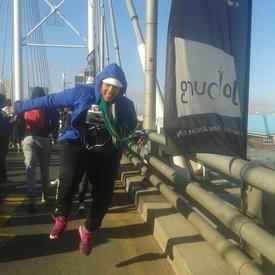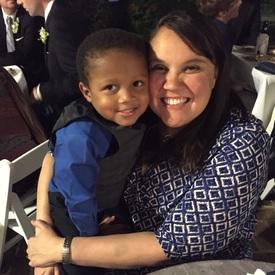Long distance running and weight loss
Options

CallmeSbo
Posts: 610 Member
Do these two work together? Or should one focus of weight loss 1st?
0
Replies
-
Yes, they do.
To lose weight you need to maintain a healthy caloric deficit (i.e. burn more than you consume). Running (any exercise, for that matter) can help accomplish this.
Just make sure to keep the deficit healthy... you don't want it to get too big.0 -
Yep, it works well together. I lost about 60 lbs training for a half marathon and another 50 lbs training for a full.0
-
Yes, they do.
To lose weight you need to maintain a healthy caloric deficit (i.e. burn more than you consume). Running (any exercise, for that matter) can help accomplish this.
Just make sure to keep the deficit healthy... you don't want it to get too big.
Thank you. I was advised by a certain someone to not go beyond 15km as a distance more than that supposedly burns muscle. And to be successful for long distance running you have to consume alot of calories, mostly carbs. I dont strength train as i can not afford gym and buying weights. So running is the only form of exercise i can do.0 -
Yep, it works well together. I lost about 60 lbs training for a half marathon and another 50 lbs training for a full.
Thank you for that testimony. I am 30kg overweight and im trainin for my 1st half marathon. I have done many 10 k and 3 15k. I think im now ready for another challenge.0 -
I largely attritbute my weight loss of over 80 lbs to it! Running rocked my body!0
-
When I'm good about running is when I lose a lot of weight. I have done two half marathons and one full marathon, and when I was training for those, I was dropping weight like a rock.0
-
I lost 12lb in one month running about 2h/day without changing diet (just stopped 500g yogurts and the daily dark chocolate piece)...since 4 weeks I maintain a small cardio -30min, high intensity intervals- 3 times/week and do some strength training the other 3 days (the weather start to be really bad, I plan another month), my weight is steady (but I keep on losing fat). If I did long runs, it is certainly because I love them (I was sure I could never run and doing 20k in the forest brings much satisfaction)...I learned to run quite fast so that I could sometimes lose 2500 cal in a day...it would mean I should get about 4800 cal that day to maintain my weight, simply impossible!0
-
One of the trainers at my gym told me it was not possible. I did my best to prove him wrong. I've lost at least 20 lbs since I started adding long distance running to my routine.0
-
If you are just starting out then you won't burn as many calories as an experienced runner since you'll be doing more of a run/walk kind of scenario. That being said,running does help to burn weight and build muscle. And any new exercise and movement will assist in your weight loss journey!

You don't have to lose weight first to run long distances. Just remember not to over do it at first...you don't want to overexert or injury yourself when you are first starting out.0 -
One of the trainers at my gym told me it was not possible. I did my best to prove him wrong. I've lost at least 20 lbs since I started adding long distance running to my routine.
You sure trained him! 0
0 -
Thank you thank you thank you for this! I stopped my half marathon training as my trainer told me I wont lose weight whilst long-distance running. Putting my running shoes on now! :drinker:0
-
Yes, they do.
To lose weight you need to maintain a healthy caloric deficit (i.e. burn more than you consume). Running (any exercise, for that matter) can help accomplish this.
Just make sure to keep the deficit healthy... you don't want it to get too big.
Thank you. I was advised by a certain someone to not go beyond 15km as a distance more than that supposedly burns muscle. And to be successful for long distance running you have to consume alot of calories, mostly carbs. I dont strength train as i can not afford gym and buying weights. So running is the only form of exercise i can do.
I would recommend adding some simple body weight exercises to your running. It will help with injury prevention. You definitely don't want to get injured so I would add some ab crunches, squats, pushups, etc to your routines. You don't need a gym to strength train. There are lots of apps for smartphones out there with body weight exercises.0 -
Those of you who have been told they don't work together... was any reasoning given as to why? I'm just curious.0
-
What I've been told is that to be able to run long distances you need fuel, ie calories, especially carbs. A lot of them. And that running burns muscles so you might end up "skinny fat". And that running increases you appetite so you end up eating too much to lose weight. I've also read some articles saying that some runners actualy put on weight whilst training for a marathon.Those of you who have been told they don't work together... was any reasoning given as to why? I'm just curious.0 -
What I've been told is that to be able to run long distances you need fuel, ie calories, especially carbs. A lot of them. And that running burns muscles so you might end up "skinny fat". And that running increases you appetite so you end up eating too much to lose weight. I've also read some articles saying that some runners actualy put on weight whilst training for a marathon.Those of you who have been told they don't work together... was any reasoning given as to why? I'm just curious.
That's largely and issue of diet then, not exercise/running, right?
I'm not a dedicated runner, but I do a lot of triathlon training so I do consider myself an endurance athlete. Yes, all that work does require carbs, but it also requires protein (which is something a lot of endurance athletes neglect, which is why people can end up skinny fat. Not to mention that with all that running often times people do very little strength training... another factor in skinny fat.0 -
What I've been told is that to be able to run long distances you need fuel, ie calories, especially carbs. A lot of them. And that running burns muscles so you might end up "skinny fat". And that running increases you appetite so you end up eating too much to lose weight. I've also read some articles saying that some runners actualy put on weight whilst training for a marathon.Those of you who have been told they don't work together... was any reasoning given as to why? I'm just curious.
You only gain weight while training for a marathon if you don't pay attention to your calories in/calories out. A lot of people while training for marathons eat a lot more than the amount of calories they are actually burning. I don't buy the 'skinny fat' thing. I was in the best shape of my adult life when I ran my first marathon. I was also strength training as well. I had lost a total of 130 lbs training for it. I think you just have to be careful how you fuel your body. Just because you are training doesn't mean you can eat doughnuts and cookies for every meal.0 -
Yes, they do.
To lose weight you need to maintain a healthy caloric deficit (i.e. burn more than you consume). Running (any exercise, for that matter) can help accomplish this.
Just make sure to keep the deficit healthy... you don't want it to get too big.
Thank you. I was advised by a certain someone to not go beyond 15km as a distance more than that supposedly burns muscle. And to be successful for long distance running you have to consume alot of calories, mostly carbs. I dont strength train as i can not afford gym and buying weights. So running is the only form of exercise i can do.
I would recommend adding some simple body weight exercises to your running. It will help with injury prevention. You definitely don't want to get injured so I would add some ab crunches, squats, pushups, etc to your routines. You don't need a gym to strength train. There are lots of apps for smartphones out there with body weight exercises.
Yes i do minimal squats, lunges etc. With 3kg weights i bought years ago. But thats about it. I cant afford to buy heavier one.0 -
I am a runner and began my weight loss journey with running (the day I decided to get healthy is the same day I signed up for a half marathon). I've lost 25 lbs since then. Long distance running is a staple of my running program and the most enjoyable part.
It's calories in versus calories out. Why would burning 900 calories running on a long day not be equivalent to burning 900 calories on an elliptical, stairstepper, weight training, etc? That makes absolutely no sense to me.0 -
Was told the same :-(
What I've been told is that to be able to run long distances you need fuel, ie calories, especially carbs. A lot of them. And that running burns muscles so you might end up "skinny fat". And that running increases you appetite so you end up eating too much to lose weight. I've also read some articles saying that some runners actualy put on weight whilst training for a marathon.Those of you who have been told they don't work together... was any reasoning given as to why? I'm just curious.0 -
lol. good question.I am a runner and began my weight loss journey with running (the day I decided to get healthy is the same day I signed up for a half marathon). I've lost 25 lbs since then. Long distance running is a staple of my running program and the most enjoyable part.
It's calories in versus calories out. Why would burning 900 calories running on a long day not be equivalent to burning 900 calories on an elliptical, stairstepper, weight training, etc? That makes absolutely no sense to me.0 -
I didn't start running until at goal weight.
I found that I actually gained a little bit (five to seven pounds) when training for a half marathon last fall.
I was fueling up the day before my long runs and then was hungry later in the day of my run. I ate within reason...not huge amounts or anything but you do need to be sure to fuel the body when going longer.
But, my pants, etc. still fit me the same.
I think you have weight to lose, you will still see a loss but wanted to throw out there that it is possible to GAIN weight instead of losing while training for a longer distance.0 -
I didn't start running until at goal weight.
I found that I actually gained a little bit (five to seven pounds) when training for a half marathon last fall.
I was fueling up the day before my long runs and then was hungry later in the day of my run. I ate within reason...not huge amounts or anything but you do need to be sure to fuel the body when going longer.
But, my pants, etc. still fit me the same.
I think you have weight to lose, you will still see a loss but wanted to throw out there that it is possible to GAIN weight instead of losing while training for a longer distance.
I think the fueling up the day before is why the weight gain happens. I've worked with training groups and my coaches have always said that you have to be careful with how many calories you consume the days before a long run. Calories in/calories out.0 -
The last Marathon I trained for I didn't watch what I ate assuming the weight would drop off and ended up a few months later the heaviest I'd been and borderline obese.
This time I'm using MFP to stay within my calorie goal while fuelling correctly, and I'm running faster, further and more injury-free than even because each week I weigh less!
Yes, keep up your complex carbs but don't neglect your protein. Also carry out some resistance training to help prevent injury and muscle loss. My coach friend says body-weight only during serious training (push-ups, core work , squats, lunges, leg-lifts etc) but I'm sneaking in a few weights too!0 -
That's largely and issue of diet then, not exercise/running, right?
I'm not a dedicated runner, but I do a lot of triathlon training so I do consider myself an endurance athlete. Yes, all that work does require carbs, but it also requires protein (which is something a lot of endurance athletes neglect, which is why people can end up skinny fat. Not to mention that with all that running often times people do very little strength training... another factor in skinny fat.
I agree that diet is why some runners report weight gains when training for an event.
When you run specifically to lose weight you are more likely settle for a sub standard run as long as you are hitting your weight loss goals. When training for a distance event there has to be a shift in mind set. In this instance you are much more likely to place a higher importance on the quality of your training runs and be be much more worried about avoiding illness/injury (many runners feel that training on a calorie deficit makes illness or injury more likely). So, distance runners often eat more in order to train at the required level.
Add to this the fact that many people underestimate calories consumed and overestimate (even with the aid of MFP) calories expended and you have a great scenario for weight gain.0 -
Was told the same :-(
What I've been told is that to be able to run long distances you need fuel, ie calories, especially carbs. A lot of them. And that running burns muscles so you might end up "skinny fat". And that running increases you appetite so you end up eating too much to lose weight. I've also read some articles saying that some runners actualy put on weight whilst training for a marathon.Those of you who have been told they don't work together... was any reasoning given as to why? I'm just curious.
This depends a lot on your individual decisions. I started running last February with the goal of racing. I lost 20lbs and then put on about 5 in the month before the race. This was because I was allowing myself to eat more (told myself I "needed" it in order to run better - never once actually felt (while I was running) like I needed more food). You just have to decide what's more important. If you're looking to win a distance race, you'll probably have to focus more on your nutrition (carboloading, etc) which can tack on a few lbs right before a race. However, if you're only doing it to help you lose weight, you'll be fine. I'm running about 20-25 miles/week right now and have been losing consistently because my focus has been on losing weight and keeping my calories in check.0 -
Are you guys talking about 2 or 4 hours run assuming long distance? Which frequency? I mean if you run 2h/day 6 days/week, you spend about 14000 cal in the week (if you have some training and are abble to maintain a quick running speed). I would sometimes change it with 2 hours bike or one hour of each. In such a spirit, of course you eat healthy food and your carbs (fruits & bread for me) have no chance to transform into fat. No the appetite increase is not enough to stop weight loss, not with me at least but this appetite increase for oranges, carrots and banana for me. Staying away from junk, I see no way not to lose weight. That is radical. The only issue is keeping the level of proteins high enough. The reason why I would eat less when running like this in comparison with pure strength training is that I do not want to weight too much, I just want my muscle to hold the 2 hours effort. That is a personal choice that you can easily overcome with protein supplements.
To me, it is impossible to lose weight with strength training and I go for cardio to lose weight, the only thing that woks for me0 -
I is an issue of balancing your nutritional needs and your exercise. If I am running a 16 mile run one day I will burn more calories than I can consume that day so the night before or maybe two nights before I may allow myself to go over by a little...like up to 300 calories over...On those super long days I might be 500 to 700 under for the day even with healthy food choices the whole long run day. I make sure I keep a deficit or stay on target for the week calorie wise. If you want to lose weight you can. If you eat cookies all day ...because you run and think you can you will gain weight.0
-
Yeah i suppose thats the main issue-balance. Chances are, if you 30kg overweight, you not running to win the race.0
-
Yeah i suppose thats the main issue-balance. Chances are, if you 30kg overweight, you not running to win the race.
Oh I wouldn't assume that at all
I'm pretty fit now, but I have been positively SMOKED in races by all sorts of body types - people taller, smaller, heavier, thinner, a mom pushing a stroller with *2* kids in it UP a hill!!
That's the beauty of running - you can't judge a runner by his or her outward appearance 0
0 -
What I've been told is that to be able to run long distances you need fuel, ie calories, especially carbs. A lot of them. And that running burns muscles so you might end up "skinny fat". And that running increases you appetite so you end up eating too much to lose weight. I've also read some articles saying that some runners actualy put on weight whilst training for a marathon.Those of you who have been told they don't work together... was any reasoning given as to why? I'm just curious.
What we are told about what to eat is a lie. I have been running marathons and half marathons for 4 years, and every single one of them leads to an increase of about 10 lbs of fat on race day. The reason being that I fueled myself with excessive carbs because that is what we're told we need to do. Turns out when you overfeed on carbs, your body burns primarily glucose during runs, leading to extraordinary hunger afterwards to replenish. If you eat a lesser degree of carbs and more fat and protein, you adapt to burning more fat, which means you can run longer without hitting "the wall", and you don't get excessively hungry between runs. Carb eaters become "sugar burners" with their ups and downs of energy and hunger. Its hard to manage.
So in short, you burn the most of the energy sources that you eat the most. So if you want to burn more fat, eat more fat.0
This discussion has been closed.
Categories
- All Categories
- 1.4M Health, Wellness and Goals
- 396.8K Introduce Yourself
- 44.2K Getting Started
- 260.8K Health and Weight Loss
- 176.3K Food and Nutrition
- 47.6K Recipes
- 232.8K Fitness and Exercise
- 450 Sleep, Mindfulness and Overall Wellness
- 6.5K Goal: Maintaining Weight
- 8.7K Goal: Gaining Weight and Body Building
- 153.3K Motivation and Support
- 8.3K Challenges
- 1.3K Debate Club
- 96.5K Chit-Chat
- 2.6K Fun and Games
- 4.5K MyFitnessPal Information
- 16 News and Announcements
- 18 MyFitnessPal Academy
- 1.4K Feature Suggestions and Ideas
- 3.1K MyFitnessPal Tech Support Questions














